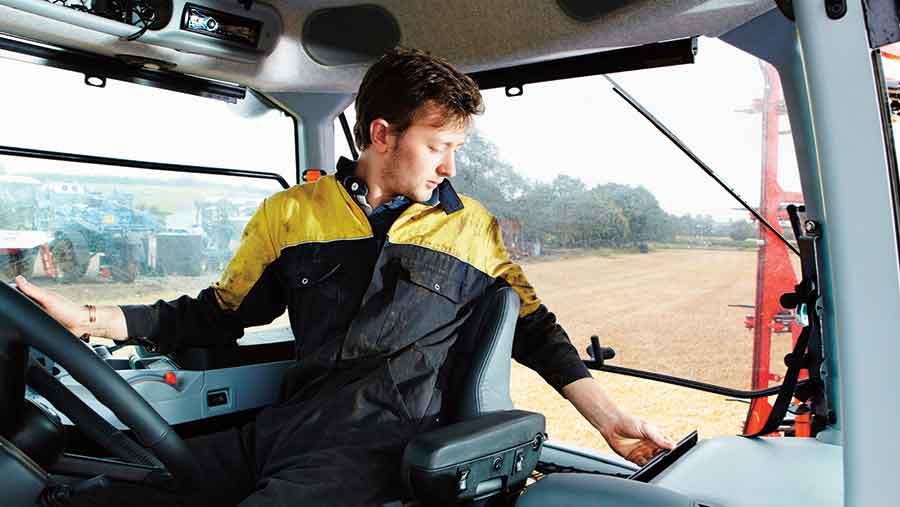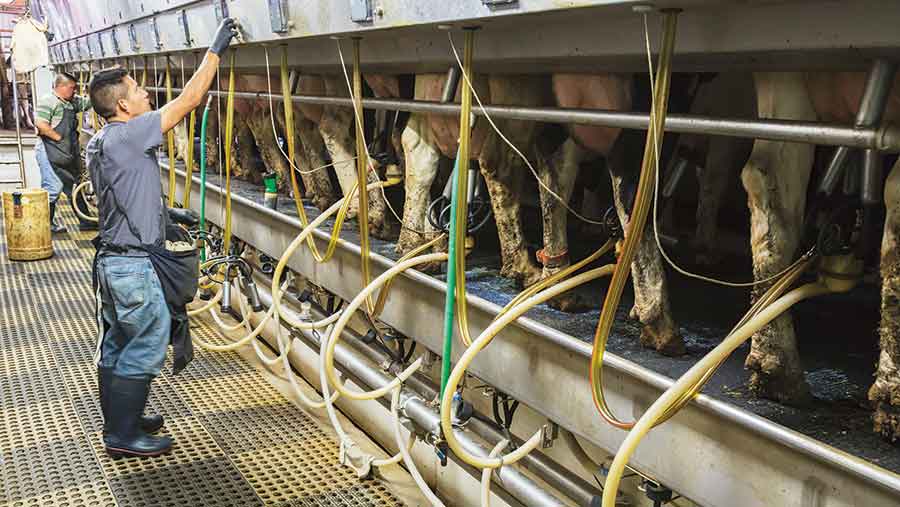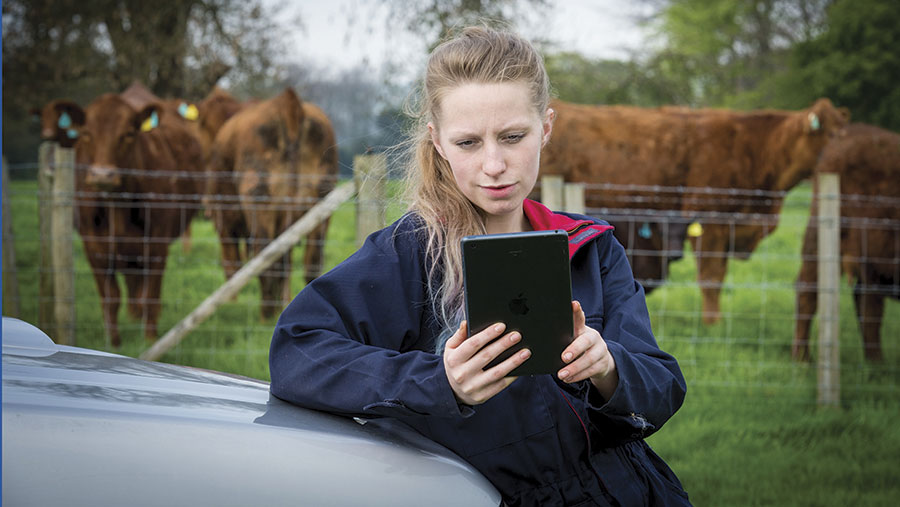What skills do agricultural employers really want?
Technology is going to become more central to even the most traditional roles in agriculture and there is already a shortage of workers with the appropriate skills, according to industry recruitment experts.
Government research shows the skills set of agricultural workers has improved in the past five years, but there are areas where workers are still short of expertise, experience or qualifications.
The UK Commission of Employer Skills (UKCES) survey showed that between 2011 and 2015, the overall number of jobs left vacant in agriculture because of a lack of skills had declined from 28% to 22%. But it also highlighted that a lack of specialist skills or knowledge was still an issue.
See also: A beginner’s guide to careers in agriculture and farming

© Cultura/Rex/Shutterstock
Skilled trade shortage
Katie Garner, manager of the BrightCrop cross-industry initiative to inspire talent to choose farming as a career, says there is clearly a need for higher quality recruits in all areas of agriculture. But, she points out, the biggest gap is in the skilled trade areas.
“While we need managers, directors and graduate trainees, the major demand is in the skilled trade sector. For example, jobs like stockmen or combine drivers, where technology is advancing quickly,” she says.
Agriculture and horticulture have almost five times more skilled trade roles (48% of the workforce) than the average for other professions (11%), according to figures provided by the land-based training organisation Lantra.
It is also more difficult to find the right recruits in the agriculture sector than other industry equivalents, adds Ms Garner, because of the perception it is a low-tech career choice.
“It is a big concern because that perception is completely wrong. Technology is booming and we need highly trained, IT-savvy staff to keep us competitive.”
Required qualifications
Ms Garner says that, in particular, the industry needs people coming out of further education at Higher Level 3 Apprenticeship grade – just below degree standard.
And they don’t necessarily require straight horticultural or agricultural management qualifications.
They could have qualifications in technology and engineering, which can be applied in an agricultural context, she says.
Get students engaged
Ms Garner’s points are echoed by Leigh Morris, chief executive of the National Land Based College – a web-based, employer-led organisation that promotes a joined-up approach to education, training, skills and career development.
“Agriculture has the highest perceived technical skills gap compared with other industries and has been named by the government as a priority industry for attention in its Post-16 skills plan,” says Mr Morris.

© Design Pics Inc/Rex/Shutterstock
The concern is not just for jobs where there are shortages now but in the longer term.
“Unless we can get school pupils of today engaged with thinking in terms of a career in our industry we won’t have the workforce coming out of the pipeline capable of using the technology from age 20-plus when they qualify.”
Mr Morris believes the land-based sector must get past the traditional pool of people it draws from and appeal to those beyond farming who have skills that can be adapted.
Communication skills
There is also a need for greater appreciation of the communication skills needed to help businesses collaborate.
“Communication skills and customer focus are often overlooked but they are big issues for small businesses,” Mr Morris said.

© Jim Varney
“Central to the skills set will be a familiarity with social media such as Twitter, Facebook and LinkedIn.
“There are huge advantages to be gained with recruits who can communicate with hundreds of thousands of people,” he says.
People management
Tess Howe, AHDB project manager for external industry skills development, agrees that communication will be one of the key skills required in future.
“Farms and horticultural businesses are getting bigger. The farm manager role is evolving from controlling a small labour team to a strategic communication and co-ordination role of contractors, consultants and workers.”
The ability to manage people more effectively is increasingly going to be seen as a desirable skill by employers, she believes.
“At the AHDB we have run courses through the Professional Manager Development Scheme which demonstrate to participants it is possible to save tens of thousands of pounds through better people management.”
Adaptability
Being able to show adaptability will also be key for the farmworker, Ms Howe says.
“Where there were two people doing a job on the farm there is now often just one.
“As well as the increasing technology demands on that person, they will be asked to perform a wider range of roles.
“Above all, they have to be able to adapt and learn on the move. It is no good having new kit if the workforce has not got people who are willing and able to learn how to operate it.”
Deal with data
John Davies, managing director of agri-business recruitment consultants DeLacy Executive, says there is growing demand for people on farms who are technology-friendly and able to understand the huge amount of data that is being produced.
“On the management side, the sheer amount of data produced needs analysing and applying. Likewise agronomists and nutritionists will have to be able to interpret information.
“In the allied trades, there is a demand for people in sales roles who can explain new technology, whether it is animal health and nutrition, agronomy, or software, electronic and mechanical engineering.
“That relies on finding people with better communication skills who are effective at building relationships.”
Huge difficulties
Richard Self, project manager for Edge Careers – an industry-led initiative that aims to help link employers, young people and training providers – says arable farmers are currently having huge difficulties recruiting the right staff.
“The role of arable worker has changed to what would be better described as crop technician,” he says.
“It is now a mixture of practical knowledge combined with the IT know-how to interpret and act upon swathes of data being produced by equipment. The individual has to be a high-calibre decision-maker.”
The pig and poultry sectors are also demanding better-trained applicants.
“Both production systems have carefully controlled environments with increasingly sophisticated tech to ensure the animals’ welfare.
“Analysing the data and making decisions carry responsibility, as well as taking a lot of skill. Yet these roles are often perceived to be purely manual jobs.”
Tips for job seekers
- Consider how food will be produced in the future – not where we are now
- Look into where technology is being used and what skills are needed to operate it
- Research where there is investment taking place and where the opportunities are
- Look at the industry as a tech industry with a diversity of opportunities
- Keep up to date with developments – read the agricultural press
- Be aware it is an ever-changing industry – be flexible and adaptable
- Show you have strong personal traits – a hunger to know and aptitude to learn
Source: Katie Garner (BrightCrop)
